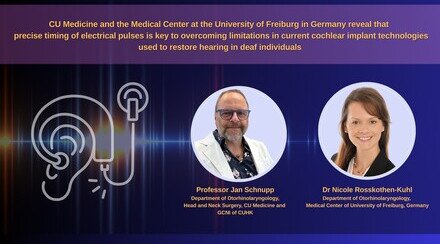CUHK Research Reveals Impact of Mild Hearing Loss on School Children Now Recruiting Hearing Impaired Students for Research on Efficacy of Intervention
A recent research of The Chinese University of Hong Kong (CUHK) revealed that children with mild bilateral hearing loss (defined as having hearing threshold in between 26-40 dB HL), if not diagnosed and intervened early, would miss up to 50% of speech sounds which may result in significant communication and learning difficulties, lack of energy and shorter attention span. Affected children may also have behavioural problems and poor self-esteem. These children are often misunderstood as not paying attention in class as they cannot hear instructions clearly. The impact of mild hearing loss on children should not be overlooked and appropriate intervention would help to alleviate the adverse impact.

(from left) Miss Iris NG, Professional Consultant, Department of Otorhinolaryngology, Head and Neck Surgery; Professor Michael TONG, Professor, Department of Otorhinolaryngology, Head and Neck Surgery; Professor Charles Andrew VAN HASSELT, Chairman, Department of Otorhinolaryngology, Head and Neck Surgery; and Professor Anna KAM, Assistant Professor, Department of Otorhinolaryngology, Head and Neck Surgery, CUHK.
The research assessed 35 children aged 6-8, of whom 83% (29) suffered significant language impairment or speech delay; about half of the children (17) said that they had difficulties in listening during classes and one-third of them had difficulties in learning and coping with school environment. None of them found it easy to listen in class. Over 85% of the teachers (30) observed the listening problem of these students, and that the problem affected their academic performance, communication and attention span, while the impact on their class participation and behaviour in school is relatively smaller. Most parents of the affected children thought their kids could hear almost all the words with occasional misunderstanding; over 40% of the parents observed that their kids had to pay extra effort to listen and understand.
Preliminary findings of the research supported that children with mild bilateral hearing loss could benefit from appropriate intervention at schools. As remarked by the teachers, the students’ academic performance, concentration and communication were improved after four months of intervention. However, some parents are reluctant to let their children receive intervention. Prof. Anna Kam, Assistant Professor of Department of Otorhinolaryngology, Head and Neck Surgery at CUHK, and the principle investigator of the project, said, ‘Parents will let their children wear eye glasses to rectify vision problems, but they are not willing to let the children use assistive listening devices or receive intervention for hearing problems which will hinder their learning and development. We hope to educate the public to eliminate discrimination against the hearing impaired.’

(from left) Miss Iris NG, Professor Michael TONG and Professor Anna KAM introduce the hearing system and hearing aid for the hearing impaired children.
Funded by the Health and Medical Research Fund of the HKSAR Food and Health Bureau, the Department of Otorhinolaryngology, Head and Neck Surgery at CUHK will launch a research to further investigate the efficacy of intervention for children with mild bilateral hearing loss. With the support of the Student Health Service, Department of Health, the research will target children diagnosed with hearing impairment in audiological assessment. CUHK is now recruiting K3 and P1 students with mild hearing loss to participate in the research. Free audiological and speech assessment as well as intervention will be provided. Interested parties are welcome to contact the research team by phone at 3505-3087, by fax at 3942-0969 or by email at admin@ent.cuhk.edu.hk.



































































